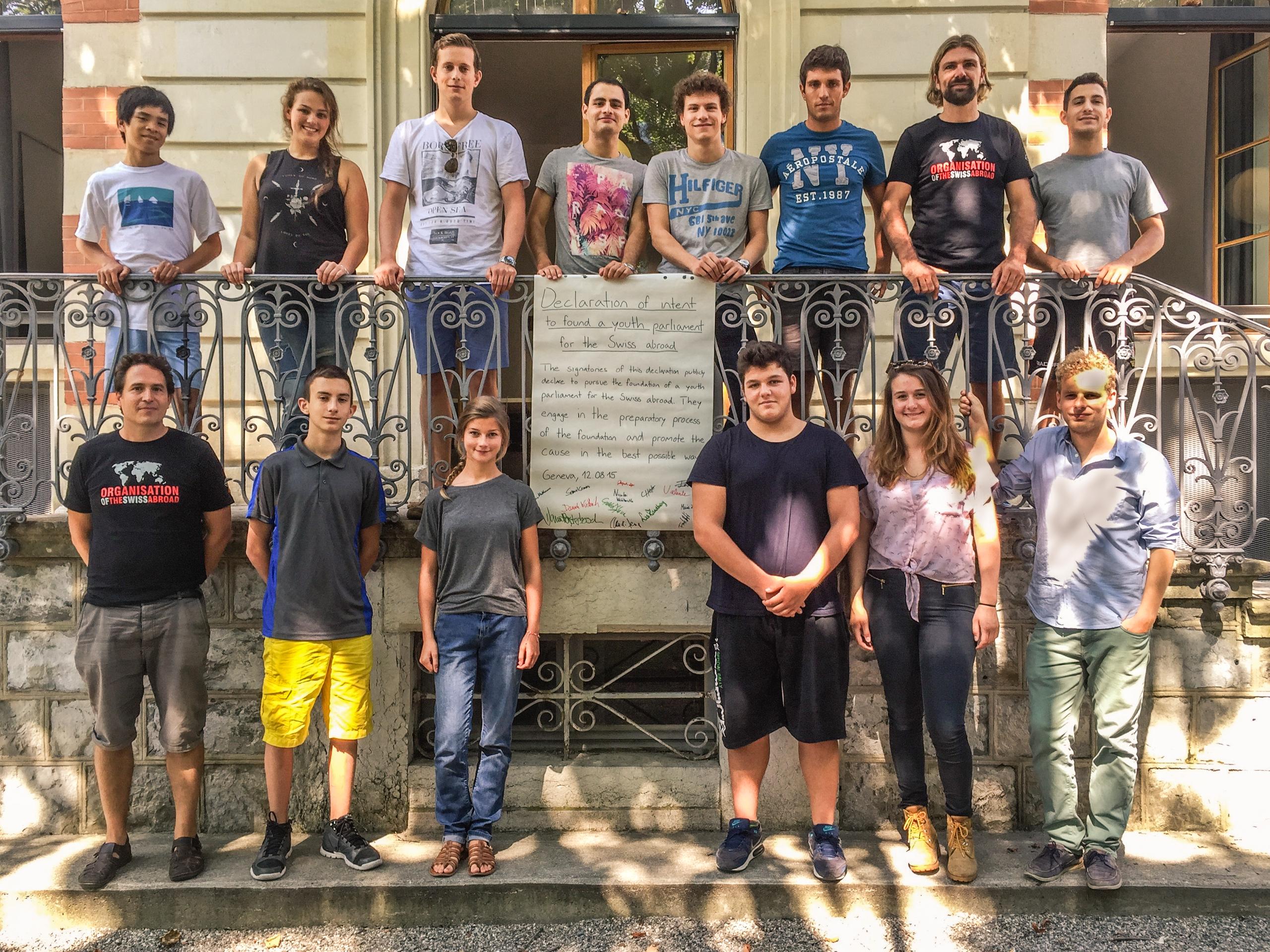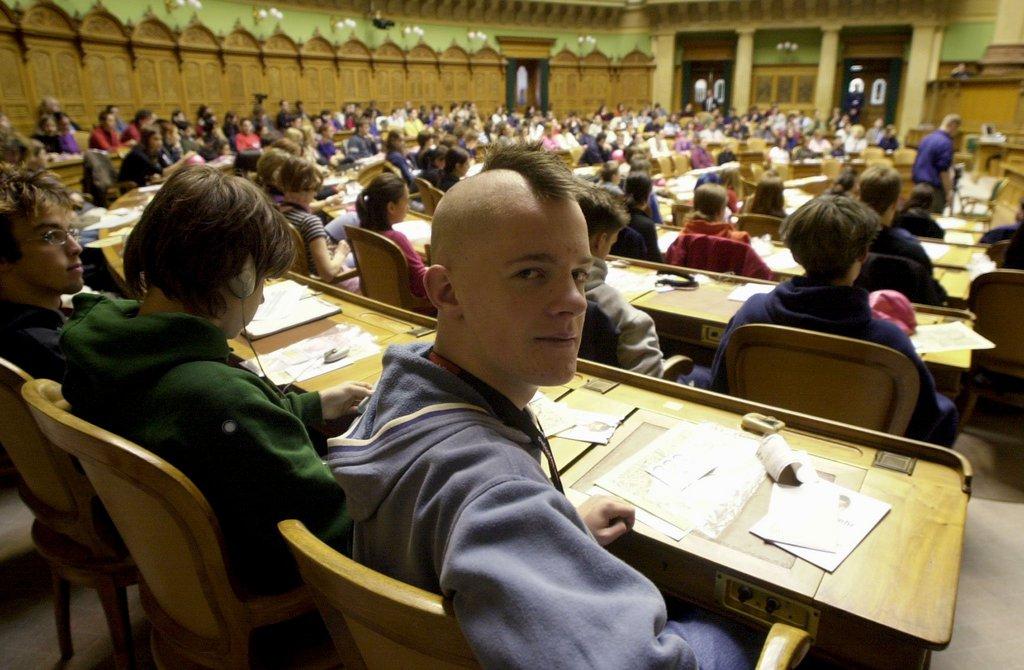‘Everyone’s political ideas are considered’

Lis Zandberg is concerned that Switzerland’s political system is undermined if citizens stay away from the polls and show no interest in votes and elections.
The 19-year old language student of politics from the Netherlands is a fresh voice of the Swiss Abroad community. swissinfo.ch gives the floor to leading members of the newly-founded online youth parliament.
swissinfo.ch: What do you want to achieve as a member of the new youth parliament of the Swiss abroad – first of all in Switzerland, and second in your country of residence?
Lis Zandberg: I believe that it is important to maintain the direct democracy system of Switzerland. The best way to do so is by involving our youths in politics at an early stage. This is happening within Switzerland, but not outside of it.

Therefore, a very important group of Swiss youth is being ignored.
We are not only omitted on a political level, but also on many others because we are so scattered around the world. I think that the Youth Parliament of the Swiss Abroad (YPSA)External link will provide us, the young Swiss Abroad, with the perfect way to get in touch with one another.
And not only become politically involved but also connected on a different level than just by our heritage.
I think that if we use YPSA as a tool to achieve our goals, it can be very powerful.
I came up with the idea of international couch surfing via Facebook page.
We have created as well skype seminars and are involving interested politicians, who will get to defend their ideals and points of view towards the Swiss Abroad community.
However, the YPSA project is just getting started and will need a lot of work within the coming years in order to actually achieve its ideals.
I will not be staying in the Netherlands for long, as I am finishing my Bachelor’s degree this summer.
However, I hope to involve and motivate other Swiss Abroad within our country to create a lively community here, as well as in the other countries around the world.
swissinfo.ch: What does direct democracy look like in your country of residence? Are there options that you especially appreciate? And ones that you miss having?
L.Z.: The Netherlands have what they call a parliamentary, so definitely no direct, democracy.
Every four years, anyone holding the Dutch passport and above the age of 18, is allowed to vote for the representatives in the Second Chamber, the members of the Provinciale Staten (who in turn elect the First Chamber), the municipality members for their municipality of residence and the members of the general assembly of the regional water authorities.
The organisation of the Dutch Democracy is based on Montesquieu‘s ideals of the Trias Politica from 1748. According to this theory, politics only works if there is a balance between the legislative, judicial, and the executive branch of the government.
Montesquieu argued for a full separation of these three, but in the Netherlands it can more be considered as a division of powers, with many checks and balances built into the governmental administration.
The Dutch democracy is relatively free and involves a reasonable amount of citizen participation.
It has created programmes like Vote Match that help the voter find the party that works best with his or her interests and ideas, therefore lowering the hurdle of actually going to the polls.
That is something I really miss in Switzerland. Not for the votes of specific issues of course, as I want to form an opinion on those for myself, but for the actual elections.
There are so many parties involved and so many opinions and ideas from all these different parties and people that I can never see the forest for the trees.
What I dislike about the Dutch democracy is that we elect representatives from different parties for four years and then have no say whatsoever in anything else. Of course, it speeds up the process, as referendums and cantonal laws make decision-making very slow.
On the other hand, it takes away citizens’ involvement in their country and leaves a very select group of people in charge, people that often do not make their promises reality.
swissinfo.ch: In most countries young people vote less often than people of other age groups. Isn’t direct democracy a prime agent for young people to communicate their political needs and ideas?
L.Z.: Of course it is. However, over the past decades we have seen turnout on the decrease in the votes. People, young as well as old, no longer seem to be motivated to uphold the true value of the direct democracy, and I think that is a shame.
Also, it depends on how you define ‚young‘. Direct democracy might be a way for youngsters over 18 to express themselves.
In this process however, anyone under 18, however motivated they may be, cannot express themselves through direct democracy.
As YPSA, we aim to provide not only those Swiss Abroad above the age of 18 with a voice within Switzerland, but also those that are younger.
swissinfo.ch: Since the attacks in Paris, Europe has been obsessed with the terrorism of the Islamic State group. Is the fight against Islamic extremists, which has led to the restriction of individual freedoms, a danger for democracies?
L.Z.: Daesh [Islamic State group] has been on Europe’s collective mind long before the attacks in Paris. Within the political and academic spheres, many a scholar and politician have considered the abhorrent crimes committed by Daesh followers.
Platform for young Swiss expats
The youth parliament of the Swiss Abroad was set up only a few months ago and is still in its infancy.
It’s primarily an online platform which brings together the about 350 members across the world for debates and other exchanges of ideas via social media and skype.
swissinfo.ch interviewed 11 young Swiss expatriates who are leading members of the youth parliament. Our questions focus on issues of participatory citizenship in their countries of residence and in Switzerland.
The attacks in Paris have however intensified the panic among citizens as this was their first true attack on European soil.
By bringing this issue so close to ‚home‘, the whole of Europe entered a new stage of panic, followed by hasty and incredibly dangerous missions in order to eliminate Daesh.
Even the Netherlands and Belgium, which barely can contribute to any war effort, have declared war on this radical grouping.
Democracy is a form of government in which the supreme power is vested in the people and exercised directly by them or by their elected agents under a free electoral system.
The fight against Daesh is not a threat towards the concept of democracy in its definition.
I honestly believe that this idea is an “over-Americanised” version of the truth. The restriction of our freedom as well as the violation of our privacy is very negative.
However, it is not a threat to the idea of democracy in its purest definition.
The fight against Daesh is seemingly impossible, as they are not an internationally recognised state with their own territory. Their unconventional warfare cannot be countered by head on charges and air strikes.
The times of traditional warfare are over, and the European states and all others opposing Daesh have to be very careful in their approach of the issue.

In compliance with the JTI standards
More: SWI swissinfo.ch certified by the Journalism Trust Initiative












You can find an overview of ongoing debates with our journalists here . Please join us!
If you want to start a conversation about a topic raised in this article or want to report factual errors, email us at english@swissinfo.ch.